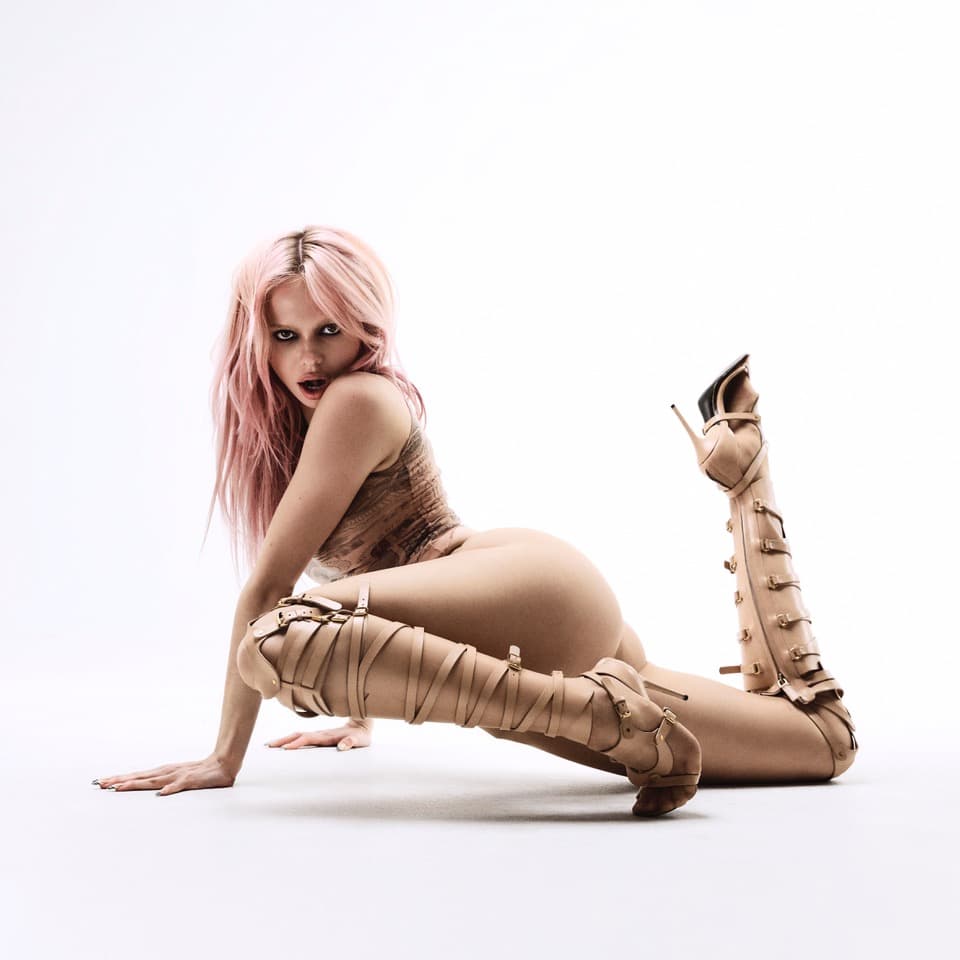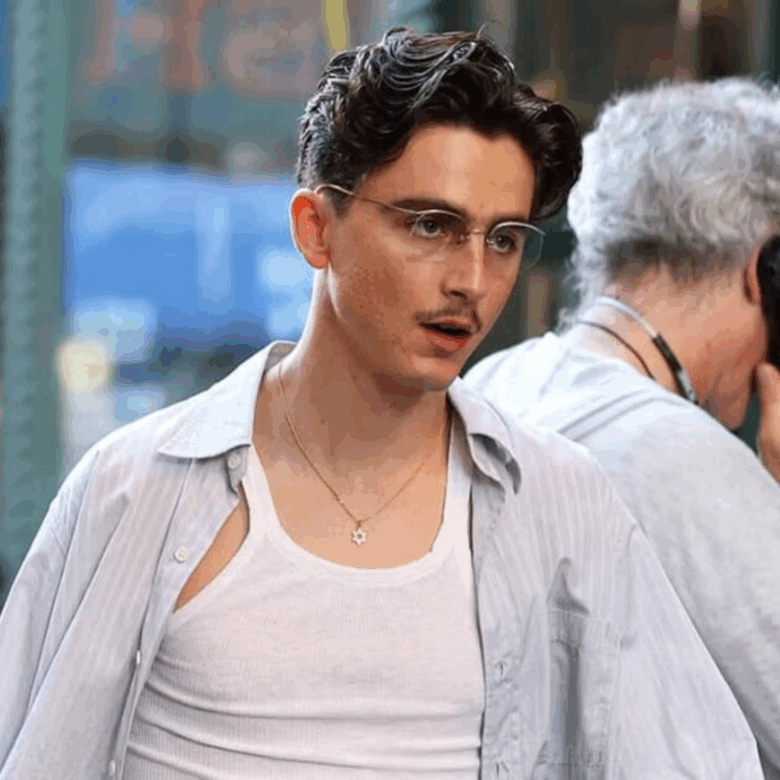Adéla has forged her own path to stardom

“Let me put on my camera,” Adéla says as she joins the Zoom call. “Sorry, I usually do this on my computer.” Suddenly, her signature pink hair appears on the screen, then a Y2K-style baby tee as she settles into the frame. Even on a rare slow morning, Adéla is the perfect blend of effortless and cool. As usual, though, the ‘SUPERSCAR’ singer hasn’t got the day to herself. “I got to sleep in this morning ‘cause I’ve been in the studio these past couple weeks,” she says in her undetectably-adopted American accent. “But then I have to start prepping for a show that we’re going to do soon. But, yeah, I’m a happy camper.” And she has no reason not to be — Adéla is one of those rare artists who’s happy to admit that she’s always wanted to be a star. Back in her home nation of Slovakia, the artist spent her childhood fixating on Disney shows, learning all the lyrics and figuring out how she could become an American — how she could “scheme” her way into the entertainment industry.
It’s funny now to think of Adéla as anything other than an innate part of the American music scene. With her unmistakable glitter-grunge aesthetic and flexible pop vocals, it’s as though she’s always been there. But, of course, it wasn’t as easy as that. Between becoming a professional ballerina in her pre-teen years to earning a spot on the Netflix show Pop Star Academy (then after two years, losing it), Adéla’s path to stardom has been both colourful and winding in equal measure. But it’s all formed who she is — someone so determined that her new single, ‘DeathByDevotion’, talks about not giving up until she’s “fucking miserable” and everyone around her is begging her to stop. This devotion is undeniably paying off, though. With millions of streams already in her arsenal, she’s just signed to Capitol Records and Polydor for her upcoming EP, The Provocateur. It’s safe to say, then, that we’ll be hearing much more from Adéla.
Scarlett Coughlan: So, what was it like growing up in Slovakia as a child aspiring to be an artist?
Adéla: Slovakia is obviously a post-communist country, so it’s quite conservative and, when I was growing up, I didn’t really ever feel like I fit in. I learnt English on my own very early on, so I got this very Americanised, liberal point of view on the world. And Slovakia is just not that. And people aren’t very open about making art.

SC: Where did your desire to tap into American pop culture come from?
A: I didn’t know that that’s what I liked, but literally since I was sentient I consumed Disney Channel. I watched it on repeat and I knew the words to every song, even though they were in English. But I didn’t realise — I was like three years old and I just thought this was ‘music language’. And then my brother was like, everything that you love is an American thing. It’s the entertainment industry. So I was like, well, I can’t be American, but how can I scheme my way in? If I sound like an American, if I act like an American, if I know the culture, who’s going to know? Who’s going to care? I’ll still be able to be the next Hannah Montana.
SC: How did you go from your fascination with pop culture to doing ballet professionally?
A: You know, I’m from an Eastern European country, so it’s the more socially-acceptable art form, and we’re really good at it. When I was in kindergarten, all the girls were doing ballet, and then my mom just put me into classes and I kept doing them. And honestly, I really didn’t think of ballet as a career until I was eleven years old. I did this nationwide audition for the one full-time ballet academy in Slovakia, and I ended up first overall in the country. But I was like, I just want to be on stage, and this is going to get me on stage, so I’m going to get really good at it.
SC: Then you wound up on Pop Star Academy. How did that happen?
A: I was sixteen and I talked to my parents like, hey, I don’t want to do ballet full-time. It doesn’t truly make me happy. And if you’re not completely passionate about it, you’re not going to be the best. And they were like, okay, well you’re going to go to a regular high school because you need to make money at some point. They were just scared for me. So I went to a regular high school, but I still kept taking vocal lessons. Then, I was reading an interview with Olivia Rodrigo’s childhood vocal coach, and I decided to look her up and emailed her. I was like, do you take Zoom students? We kept doing our lessons and she was like, you need to do this as a career, and I was like, sis, I know, but I’m in fucking Slovakia. How the fuck? But she was following Interscope because Olivia was signed to them, and they posted the flyer for a global girl group audition. She was like, you need to submit a video. And I did. I went through all the rounds of auditions and I got in. Yeah, it’s very kismet, you know?

SC: What was the Pop Star Academy experience like for you?
A: It was truly like college for the industry. Even the things where I was like, oh, I don’t want to do that, or I don’t want to sing like that, everything was so important for me to understand myself better as an artist, and I’d bookmark it in my brain for later. Now I know what’s important to me as an artist from the creative side, but also from the business side.
SC: Do you think it’s since then that you’ve really discovered who you are as an artist?
A: So, I got eliminated and then we had a year between then and the show being released on Netflix. That year was the worst fucking year of my life. It sucked so bad. I did not know what the fuck I was doing. I was so lost. I was just off a show where, for almost two years, somebody else was telling me how to fit into a group, so it was really hard and not a clear path to finding myself again. It was a lot of trial and error — a lot of sitting down and writing a document, and thinking about myself as a person and my artist character. The personality, the message, the ethos. I had to regroup and for two months straight I was in, like, solitary confinement, really locked in. It’s still becoming more crystallised with every release and I’m getting a tangible feeling that I’m finally truly finding myself, but I think even where I started was pretty potent.
SC: How would you describe the way you’ve characterised your artist project?
A: Well, inherently, I was introduced to audiences as this very honest, raw person on the show, which is what I am and what my artist project will always be. I think it’s honesty at its purest. The most visceral emotions that I have — the worst emotions, but also the most beautiful ones. And I don’t necessarily care if people like me, because negative and positive emotions hold the same weight to me.
SC: You also seem to be leaning into your Eastern European identity more now.
A: That’s something that me and my stylist and creative director Chris Horan, have talked about a lot. We do love the Eastern European vibe because that is me, and it feels very cool to do that because it’s authentic. At the beginning, I saw it as such a huge disadvantage, but now we’re leaning more into the brutalism and the communist vibes of it all — without the ideologies.

SC: There’s sometimes a fetishisation that comes with Eastern European women. How do you embrace the sexual aspect of your aesthetic, but in a way that feels empowering to you?
A: I think about that a lot because I’m naturally a sexual person. I love sex and I love expressing myself in that way. But you’re right, Slavic women and just females in general have always been sexualised through the male gaze. I actually have a song on the EP about this, where I look at my own sexual expression, and I’m like, would I express myself this way if I wasn’t fed all of this content throughout the years from these pop girls, who’ve ingested the male-gaze sexualisation of women before them? I wish I was a clean slate and saw how I truly wanted to express my sexuality, but what I’m doing feels good for me right now and it empowers me. It never feels like too much because nudity and sex is not offensive to me or very special at all. But if I’m going to be sexual, I want there to be a point to it. If it serves the story, I have no trouble being that because I’m extremely comfortable with it. But I also have no trouble with not being sexual at all.
SC: You mentioned your EP — what can you share about it?
A: The EP is going to come out later this summer. Everything that we’ve released so far has been this meta look at a woman who’s really trying to make it in the industry. It’s a story of me, but turned up to a thousand — over the top, kind of rage-baity, loudmouth.
SC: When our interview comes out, you’ll have just released ‘DeathByDevotion’. What’s the story behind the song?
A: This one deals with how everybody’s always like, being resilient is so good and being resilient is such a positive trait. But I think there is a negative side to resilience when you can’t stop until you literally can’t walk anymore. For me, at no point am I ever going to give up until I’m so fucking miserable, everybody else around me is miserable, and they’re like, please stop.
SC: So, you have this persona in your EP, but what do you think defines you as a person?
A: I think my honesty is a big one, and my knowledge of self-worth. I’ve been told no so many times, and I’ve gotten so much backlash on the internet and I really could not give less of a fuck because I’ve been working for this since I was a kid. So yeah, being honest, being open-minded, being empathetic and wanting to start a conversation with my art.
- WriterScarlett Coughlan




